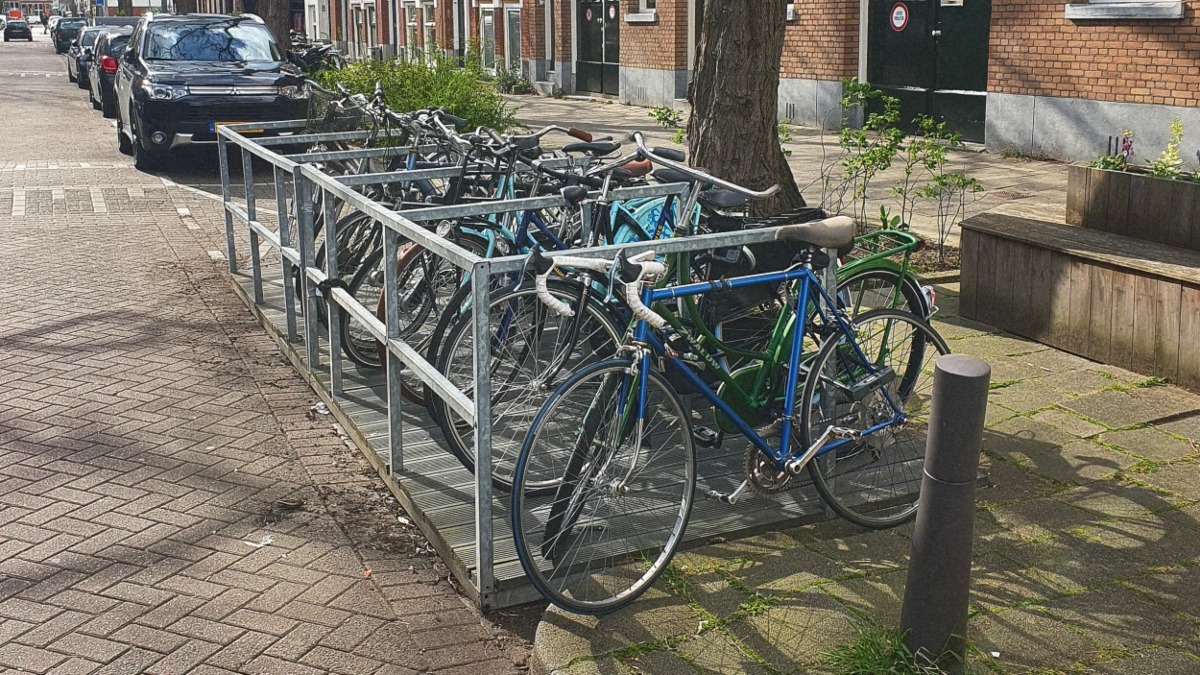
Making space for bike parking in Rotterdam
Our CRC Network Member, Rotterdam, is implementing an innovative way to sway public opinion in favour of bike parking. This clever idea is a reminder of the key role bike parking can play in ensuring a positive modal shift towards more cycling!
Perhaps the most undervalued and least sexy of the various bike infrastructures, bicycle parking is becoming more and more of an interest to public authorities and advocates alike. Given the surge in interest in cycling over the past couple of years and the increase in the number of bikes on the roads and under bums, we now need to work out where and how to store them all.
Just like cars, bicycles are parked for the vast majority of time. Therefore, it is crucial that we find innovative ways of being able to store them. According to Heinen & Buehler the lack of access to bike parking can be a barrier to their uptake, while worries about theft and other security concerns, such as a lack of lighting or weather protection, can also impact bicycle modal choice.
As usual, it all comes down to tussling with other modes of transport to get access to the most precious transport resource: space. For on-street parking, taking away space from motorised vehicles and giving it to sustainable modes is the goal of many local public authorities, but how can we do this without upsetting the vocal car-driving residents? A selection of Dutch (who else!) cities have come up with an interesting solution: using a ready-made raised bed of ten bike-parking spaces, known as a "fietsvlonder", that conveniently takes up the same space as one car-parking space. A lorry pulls up, drops the fietsvlonder into a space, and the city awaits feedback.
Yvonne Schutte, a project leader for the city of The Hague says, “Over time, the objections fade. Everyone sees that the bicycle platform is immediately put to good use, that there is a real need for it, and that one ‘sacrificed’ parking space makes hardly any difference to the parking pressure.” Originally, the idea came from planners in the city of Rotterdam in 2015, who wanted to increase cycling levels in a neighborhood that had extra car parking. After the city's government tested the platforms in one location, they were soon implemented throughout the city, and are now used by the city maintenance department as a standard tool. Taking over the city, one parking space at a time!
But bicycle parking is a local issue, I hear you say – surely not something that the European Cyclists’ Federation can get involved in? Well, I’m glad you asked. Currently the European Union is updating the Energy Performance of Buildings Directive (EPBD). This Directive outlines the targets and measures that Member States must implement in order to improve, you guessed it, the energy performance of their buildings. Traditionally, the only transport element has been electric cars, with the Directive insisting that there needs to be e-car charging points available in European buildings. However, for this update, ECF has been working hard for bicycle parking to be included, and the Commission has duly obliged in their proposal. Bike parking will be, in some form or another, an important element in this Directive for all European non-residential buildings and all new/renovated residential buildings with access to a certain sized parking area.
Why is this important for the energy performance of buildings?
Equipping new and renovated buildings with bicycle parking not only makes the building more bike friendly and energy efficient, it also creates a more desirable place to live and work. Bicycle parking has a much lower carbon footprint compared to car parking. Households’ total energy consumption is 38-50% lower for non-car owning households than for car-owning households. Lack of bicycle infrastructure can be a barrier, while an increase can be an encouragement to more cycling.
The proposal is now being debated by the two legislative bodies, the European Parliament and the Member States in the Council. We will be recommending, urging, proposing and advocating for the inclusion of charging points for e-bikes, areas for cargo bikes, and of course, introducing minimum bike-parking requirements. Here’s our page dedicated to this issue: ecf.com/what-we-do/making-buildings-fit-cycling
This can be an important legislative update that can assist or cajole the European Member States to improve, and greatly increase, the off-street parking capacities for bicycles around Europe.
This article was partly based on information provided by the City of Rotterdam. Rotterdam is part of our network of cities and regions committed to promoting cycling as a mode of transport and leisure, collectively representing almost 50 million citizens across Europe and beyond. For more information on ECF’s CRC network and how to join, visit our Cities & Regions for Cyclists page.
Cover photo courtesy of the City of Rotterdam.
Regions:
Network/Project Involved:
Contact the author
Recent news!
Upcoming events
Contact Us
Avenue des Arts, 7-8
Postal address: Rue de la Charité, 22
1210 Brussels, Belgium










